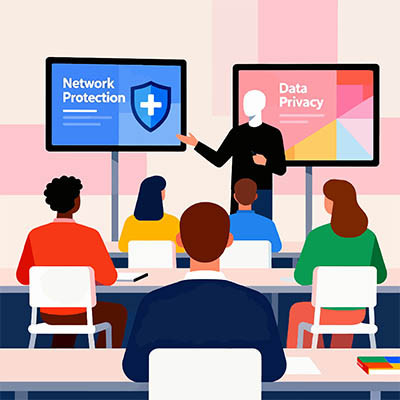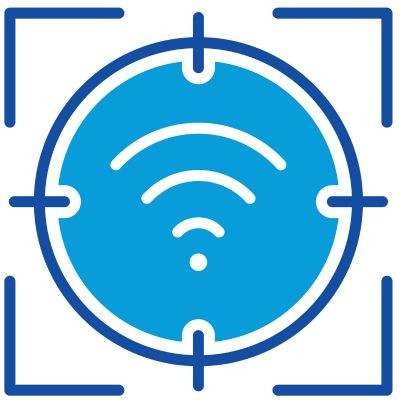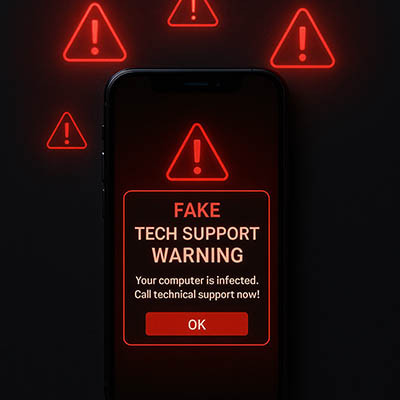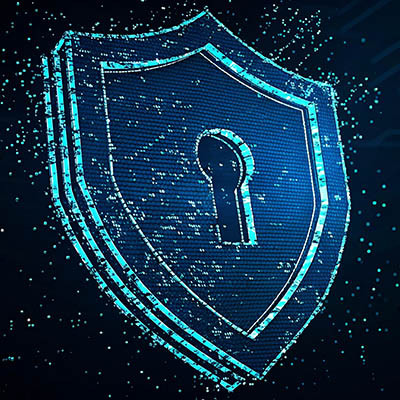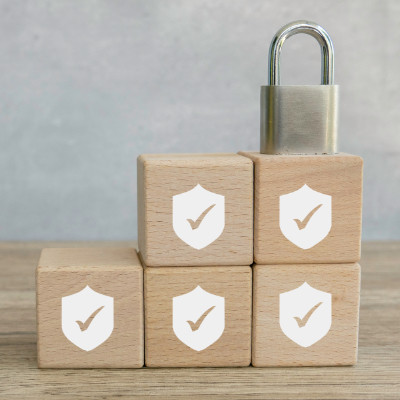It’s known that baby toys can aid in all manner of developmental processes, so take a moment to imagine what the future of technology holds for toys. Will they continue in the same vein as toys that teach color recognition, teamwork, sharing, and creativity, or will they get even more wild and out of the box? Regardless, one thing is for certain: security challenges exist just on the horizon and will have to be addressed if parents want to keep their children safe.
Accucom Blog
By now, AI isn’t just a buzzword in the 2026 boardroom—it’s the plumbing. But as developers race to push the tech into uncharted territory, the line between "breakthrough" and "breakdown" has become razor-thin. Today’s story is a cautionary tale about the leap from AI that talks to AI that acts, and how a single developer’s viral hit accidentally birthed a multi-million dollar heist and a digital cult.
The most sophisticated firewall in the world cannot stop a human being from making a split-second mistake. Cybercriminals are not just hacking code; they are hacking your employees. By exploiting high-stress environments and the natural desire to be helpful, hackers create click-first, ask-later scenarios that can bypass your entire security stack in an instant.
To defend your business, you do not necessarily need a bigger budget, while that would be nice. You need a better habit. Enter the 3-Second Rule.
If you asked your team what they remember from the last annual security compliance video, we bet they’d be hard-pressed to remember anything of importance. That’s because most small business security training is like going to the dentist; you go once a year, and only because you have to. The unfortunate reality is that most people are going about security training from the “annual compliance” perspective, which isn’t doing your business any favors, and more importantly, doesn’t change their behavior.
Traditional cybersecurity has long been built on a foundation of restriction and reprimand. However, treating employees as the weakest link creates a dangerous paradox: the more you monitor and scold your team, the higher your actual risk becomes.
When an employee fears professional retaliation for a digital mistake, they don't become more careful… they become more secretive. They delete the suspicious email, close the flickering tab, and pray. This silence is a gift to threat actors, giving them the weeks or months they need to move through your network undetected.
We’ve all seen the Internet represented as an iceberg in images and videos explaining the deep web. The surface web—the part you use every day—is just the tip. Below that is the Deep Web (password-protected sites), and at the very bottom is the Dark Web, a hidden layer where anonymity is the primary currency. From a business perspective, the Dark Web isn’t just a scary place; it is a thriving marketplace for your company’s stolen assets.
Clutter is a part of life, but one place you absolutely don’t want it is your business’ network. This clutter is called “digital cruft,” which 1) is an actual word, and 2) creates serious problems if you let it accumulate. Your digital cruft can lead to significant vulnerabilities that put your network at risk.
As a cybersecurity professional, I've seen organizations of all sizes and sectors make a critical, often fatal, mistake: they wait for the water to boil. They operate under a reactive cybersecurity model, adopting the same slow, passive approach as the hapless subject of the boiled frog analogy.
It’s a tale I recently rediscovered, and it's a chillingly perfect metaphor for modern cyberrisk. Imagine a frog enjoying a cool bath as the water is slowly, almost imperceptibly, heated. It thinks it’s enjoying a relaxing bath until the water reaches a lethal temperature. By then, it’s too late. The danger has crept up, and the frog is boiled.
Imagine you’re going through your workday, business as usual, until all of a sudden, you lose control of your computer. A message displays across your screen stating that your files have been encrypted and they will be permanently deleted unless you pay a huge ransom. Meanwhile, you’re sitting there thinking, “Why me? Why my small business?”
Cybersecurity is not just for enterprises; it’s for all businesses, big and small. You need to take proactive measures now so you don’t pay for your inaction later.
There are a lot of threats out there, ranging from simple and annoying viruses to business-ending ransomware. Do you know how these threats end up on your network in the first place, and more importantly, how do you protect your network from these threats? Today, we’re exploring the various avenues a cybersecurity threat might take to install itself on your device, as well as what you can do about it.
One of the most common tactics used by folks in the service industry is free Wi-Fi. It draws in people who want to work out of the office in places such as coffee shops, restaurants, and book stores… but how much can you actually trust that free wireless access? We think it’s probably shadier than you think, and if you’re smart, you’ll avoid using it for the following reasons.
IT support is one of those necessary parts of running a business, whether it’s to handle the small issues or the larger problems. The worst of us, however, take advantage of people’s need for IT support and leverage it in targeted attacks to exploit others. We’re talking, of course, about cybercriminals, and if you’re not careful, you might find yourself the target of a fake IT support attack.
If you are like me, you’re constantly juggling a dozen different things. You spend your days building client relationships, refining your product, and handling situations you never could have dreamed up. The last thing you need is to lose sleep worrying about whether or not your data is safe.
The truth is, cyberattacks are a very real risk for everyone. Ransomware, phishing scams, and other cyberattacks can cripple your business’ ability to thrive. Here are some smart, proactive steps you can take to build a strong security posture that will go a long way toward protecting your digital assets.
Is your business prepared to square off against ransomware? It can be scary to even imagine your business becoming the target of an attack that essentially takes your operations hostage. Are you going to let ransomware extort money, hold your data for ransom, and threaten your business’ future? The answer is no, and we’ll show you how you can not only prevent ransomware attacks, but respond appropriately in case you can’t completely prevent them.
How well is your business secured? At the very least, you’re bound to have a lock on your business’ doors, with additional locks protecting different rooms, desk drawers, and other resources, right? Of course… otherwise, you’re leaving your business vulnerable to all kinds of crime.
You need to have the same prepared for the digital side of your business as well, in the form of written policies. Let’s go over five of the security policies you absolutely need.
How much does your business prioritize security on the organizational level? The more your business relies on technology, the more susceptible it is to the countless threats that exist in the technological space, and you have to remain cognizant of that as you strive to move your business forward. Today, we’re looking at how each and every individual on your staff contributes to the security of your organization and, consequently, its data.
Don’t underestimate the danger of a cyberattack. Even small ones that are seemingly insignificant compared to major threats, like ransomware, have the potential to cause serious disruption to your operations. Regardless of the severity of the threat, you want to have an incident response plan that is tested, documented, and ready to deploy at a moment’s notice. Let’s go over what happens in the hour following a cyberattack and why acting quickly is so important.
It can be challenging to find reliable IT advice nowadays, particularly when it comes to cybersecurity. Between coworkers with the best intentions and the online influencers selling their guides and platforms, there’s a lot of advice out there. Unfortunately, a lot of it is outdated or incorrect.
This can be actively dangerous where your business’ security is concerned.
Let’s address some of the most common security myths we still encounter far too often.
From the chatbots you interact with to the tools helping you draft emails or analyze data, AI is everywhere. It’s an amazing tool that can help you boost efficiency and completely realign everything you do. Here’s something crucial you might not have on your radar: prompt hacking.
This isn't some far-fetched tech nightmare; it's a real and present danger. Prompt hacking can quietly undermine your company's data security, reputation, and its financial health; and since business today is increasingly AI-driven, understanding this isn't just your IT department’s job—it's yours too.
Most, if not all, of us have heard the most famous phishing story of them all: how the ancient city of Troy, after ten years of war, finally fell after a raiding party was allowed into the gates by hiding in the belly of a constructed wooden horse. It’s true… the legend of the Trojan horse, already associated by name with a nasty cyberattack, is arguably also a cautionary tale about how effective phishing can be.
Let’s go over how you can help protect your business from falling for this truly classic ruse.




